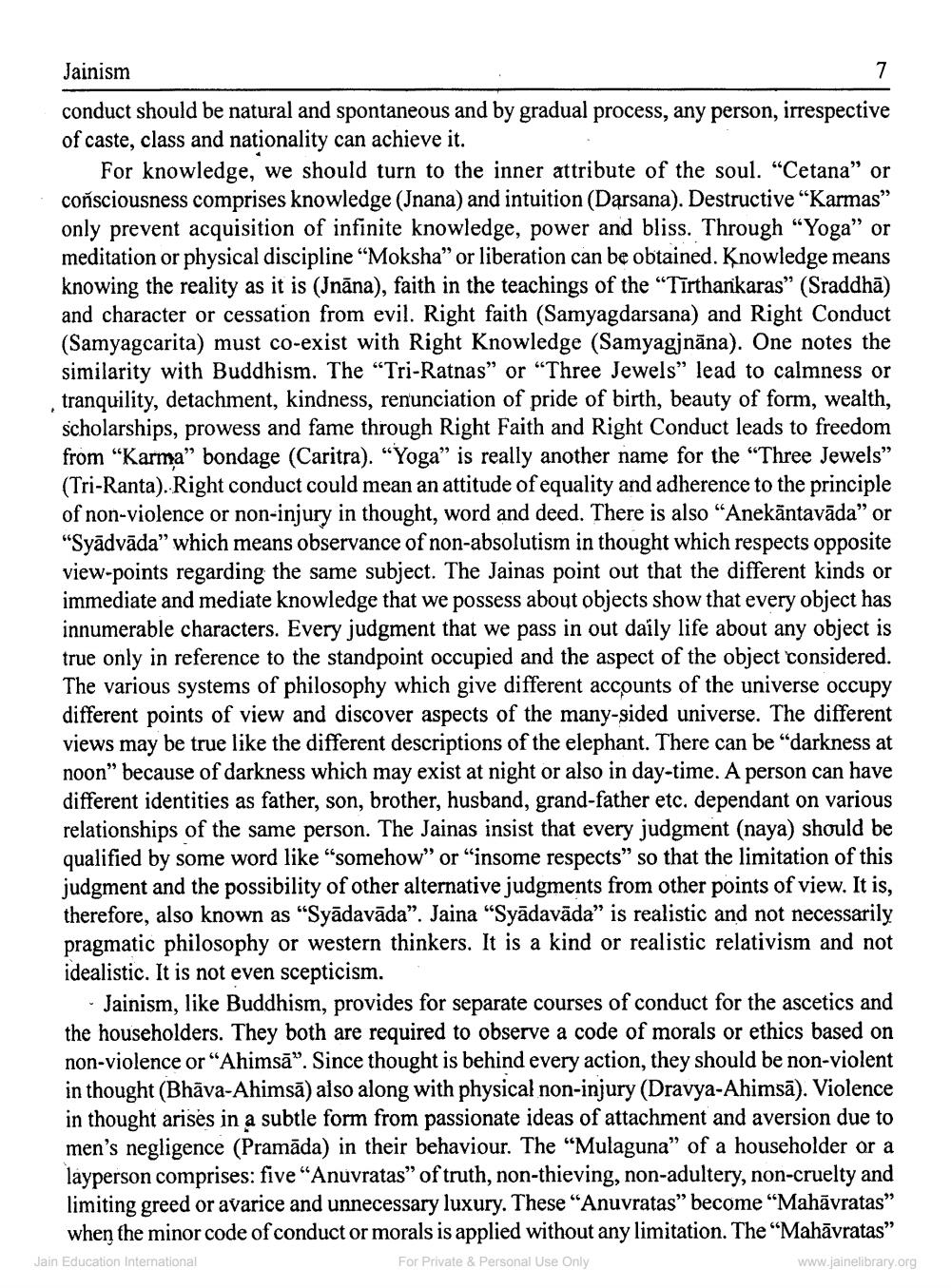________________
Jainism
conduct should be natural and spontaneous and by gradual process, any person, irrespective of caste, class and nationality can achieve it.
For knowledge, we should turn to the inner attribute of the soul. “Cetana" or consciousness comprises knowledge (Jnana) and intuition (Darsana). Destructive “Karmas” only prevent acquisition of infinite knowledge, power and bliss. Through “Yoga" or meditation or physical discipline "Moksha" or liberation can be obtained. Knowledge means knowing the reality as it is (Jnāna), faith in the teachings of the “Tīrthankaras" (Sraddhā) and character or cessation from evil. Right faith (Samyagdarsana) and Right Conduct (Samyagcarita) must co-exist with Right Knowledge (Samyagjnāna). One notes the similarity with Buddhism. The “Tri-Ratnas” or “Three Jewels" lead to calmness or tranquility, detachment, kindness, renunciation of pride of birth, beauty of form, wealth, scholarships, prowess and fame through Right Faith and Right Conduct leads to freedom from “Karma" bondage (Caritra). “Yoga” is really another name for the “Three Jewels” (Tri-Ranta). Right conduct could mean an attitude of equality and adherence to the principle of non-violence or non-injury in thought, word and deed. There is also “Anekāntavāda" or "Syādvāda" which means observance of non-absolutism in thought which respects opposite view-points regarding the same subject. The Jainas point out that the different kinds or immediate and mediate knowledge that we possess about objects show that every object has innumerable characters. Every judgment that we pass in out daily life about any object is true only in reference to the standpoint occupied and the aspect of the object considered. The various systems of philosophy which give different accounts of the universe occupy different points of view and discover aspects of the many-sided universe. The different views may be true like the different descriptions of the elephant. There can be "darkness at noon” because of darkness which may exist at night or also in day-time. A person can have different identities as father, son, brother, husband, grand-father etc. dependant on various relationships of the same person. The Jainas insist that every judgment (naya) should be qualified by some word like "somehow" or "insome respects" so that the limitation of this judgment and the possibility of other alternative judgments from other points of view. It is, therefore, also known as "Syādavāda”. Jaina "Syādavāda” is realistic and not necessarily pragmatic philosophy or western thinkers. It is a kind or realistic relativism and not idealistic. It is not even scepticism.
- Jainism, like Buddhism, provides for separate courses of conduct for the ascetics and the householders. They both are required to observe a code of morals or ethics based on non-violence or “Ahimsā". Since thought is behind every action, they should be non-violent in thought (Bhāva-Ahimsā) also along with physical non-injury (Dravya-Ahimsā). Violence in thought arises in a subtle form from passionate ideas of attachment and aversion due to men's negligence (Pramāda) in their behaviour. The "Mulaguna" of a householder or a layperson comprises: five "Anúvratas" of truth, non-thieving, non-adultery, non-cruelty and limiting greed or avarice and unnecessary luxury. These “Anuvratas” become “Mahāvratas"
when the minor code of conduct or morals is applied without any limitation. The "Mahāvratas" Jain Education International For Private & Personal Use Only
www.jainelibrary.org




